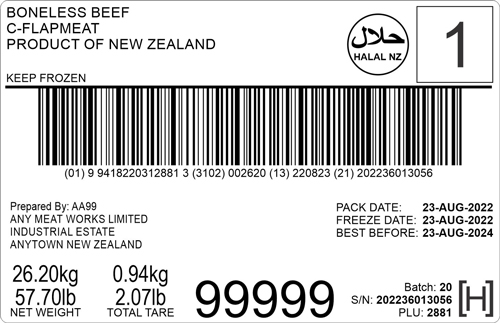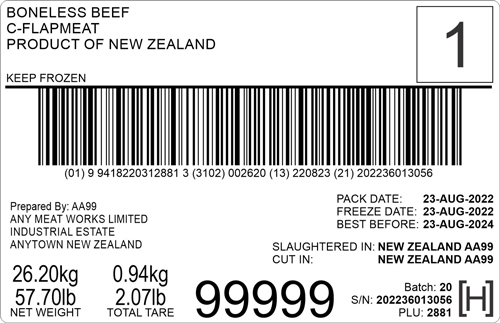Meat Messaging for New Zealand  BARCODING SPECIFICATIONS PDF
BARCODING SPECIFICATIONS PDF
Non-Retail Meat Case/Carton Barcoding Specifications for New Zealand Exporters to the US
This non-retail meat case/carton barcoding specification outlines the barcoding requirements to achieve compliance with the following:
- USDA Food Safety and Inspection Service Directive 9900.5, Rev 2.,
- USDA Food Safety and Inspection Service NOTICE 37-19 10/8/19,
- GS1 North American Industry Guidance for Standard Case Code Labeling,
- GS1 Traceability for Meat & Poultry U.S. Implementation Guide.
Standardised barcoding is the foundation for trading and logistics efficiency along the meat supply chain. Aggreed meat indusrty application identifiers (eg the full barcode informationdata) provide further regulatory information that can be used by USDA FSIS. If all the users along the supply chain cannot readily scan and interpret the information contained within case/ carton barcodes then traceability, accuracy and efficiency are lost. Most companies in the fast moving consumer goods (FMCG) industry, as well as the meat industry, comply with the GS1 standards for barcoding non-retail variable weight case/ carton products. However, some manufacturers and exporters have somehow implemented labelling systems that apply barcodes that do not meet the GS1 standards. When these non-compliant products are identified within the supply chain the results are delays, errors and the loss of vital traceability information. This includes not being able to use the barcode for the requirements outlined in the FSIS Directive 9900.5.
Barcoding Symbology
The barcode symbology used for non-retail meat case/carton label is the GS1-128. The GS1-128 barcode allows secondary attribute information over and above primary item identification to be represented in the barcode. Application Identifiers (AIs) effectively act as prefixes for this information and define the meaning and structure of the embedded data which follows. For technical information on the GS1-128 barcode and GS1 system refer to the GS1 websites: GS1 US https://www.gs1us.org/ or GS1 New Zealand https://www.gs1nz.org/
Example labels

Format 1

Format 2
Minimum Barcode Information
Minimum barcode information required represented by Application Identifiers (AIs):
| AI | Example Data & Format | Attribute Information |
|---|---|---|
| (01) |
994182203128813 n14- 14 digits numeric (fixed length) |
Global Trade Item Number (GTIN) Item Identification. (Primary identification of the product carton) 9 indicates that it is a variable measure (weight) product 941822031 - GS1 Company Prefix. (7, 8 or 9 digits in length depending on the GS1 prefix allocated) 2881 - Company product code. (3, 4 or 5 digits in length) 3 - Check digit |
| (310n) |
002620 n6 - 6 digits numeric (fixed length) |
Net Weight - Kilograms (Pounds can be used where commercial required) In this example as n=2, start at the very right of the measurement data field and count to the left 2 places. The net weight is 26.20 kg. (n indicates that the position of the decimal point is n places to the left of the end of the number e.g., 3102) NB: Weight information is mandatory if the item is a variable weight trade item. The AI 320n can be used for new weight pounds where required. |
| (13) |
220823 n6 - 6 digits numeric (fixed length) |
Packaging Date (YYMMDD) (This is the production date for traceback) In this example, the packaging date is 23rd of August 2022. |
| (21) |
202236013056 an…20 – alpha numeric up to 20 characters (variable length) |
Serial Number (allows for carton data to be captured when samples are selected for analysis) In this example a 12 digit numeric only serial number has been allocated. The serial number ensures every case/ carton manufactured for that date is uniquely identified and traceable. NB: If a generic product is produced by more than one manufacturer and barcoded with a customer's item identification number, then possible duplication of serial numbers could exist. |
Maximum Length
When concatenating Application Identifiers (AIs) the maximum number of characters in the GS1-128 barcode symbol must not exceed 48. This includes Function Code 1 (FNC1) when used as a field separator but excludes auxiliary characters and the Symbol Check Character (Modulo 103). The length of the GS1-128 barcode symbol must never exceed 165mm, including the Quiet Zones (light margins).
Height of Bars
In the meat industry, the minimum bar height is 13mm. For scanning in a General Distribution (automated scanning) environment, the minimum bar height for a GS1-128 barcode symbol is 32mm.
Human Readable Interpretation
Print the human readable interpretation either above or below the symbol bars. Make sure the Application Identifiers (AIs) are clearly recognisable by placing them in brackets in the human readable interpretation only.